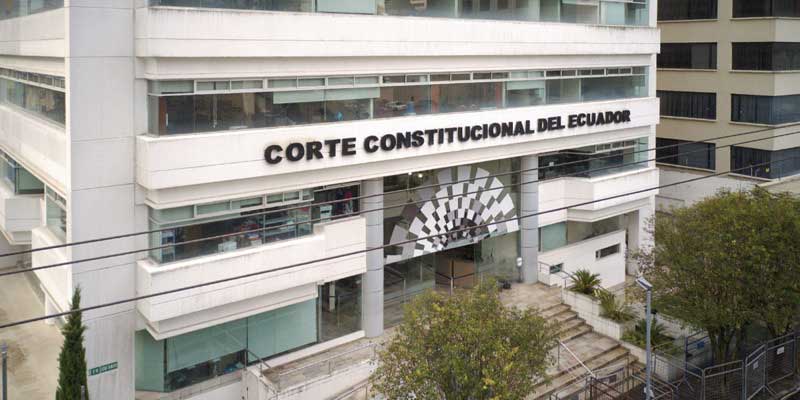Among others, the Constitutional Court decided that the simplified tax regime (Rimpe) as well as the latest changes in the oil sector do not conform to the Constitution.
The latest tax reform, which was published in the Official Registry on November 29, 2021, will undergo important changes.
The Constitutional Court, in a session held on October 28, 2022, declared some aspects of the so-called Organic Law on Economic Development and Fiscal Sustainability to be unconstitutional.
They are:
- Reforms to the Hydrocarbons Law.
- Special income tax regime for entrepreneurs and popular businesses (RIMPE).
- Voluntary, unique and temporary tax regime for the regularization of assets abroad (RIVUT).
- Inheritance tax exemption.
In a statement, the Internal Revenue Service (SRI) highlighted that the Court said that despite the declaration of partial unconstitutionality, “the fundamental texts of the law have been ratified to guarantee fiscal stability.”
The agency assured that “it will continue working on facilitating and optimizing the tax system.”
Oil reform
In the case of the reforms introduced to the Hydrocarbons Law and the Galapagos Special Regime Law, the majority of the judges of the Court said that they are incompatible with the principle of unity of matter by not maintaining a connection with the thematic axis of the Decree-Law.
Regarding the changes in the oil sector, the Court declared articles 131 to 145 unconstitutional, due to the form, with effect for the future from its publication in the Official Gazette.
According to the SRI, these articles sought the “modernization of the oil sector.”
They established, for example, that the State may concession, exceptionally, the exploration and exploitation of new areas. And it would be able to delegate those areas that are already in production in the hands of Petroecuador.
For the concession, the Ministry of Energy could enter into contracts for participation, provision of services for exploration or exploitation of hydrocarbons. And there would be the possibility of changing the current service contracts to those of participation for the oil companies.
The reform, now declared unconstitutional, allowed the Ministry of Energy to delegate to private initiative the activities of importing, storing, distributing and marketing petroleum-derived fuels.
It also it established that natural persons or companies engaged in the importation of fuels, petroleum derivatives, biofuels and natural gas are exempt from tariffs.
In addition, the reform proposed changes in hydrocarbon refining activities and proposed that the Government could directly subcontract the refining of Ecuadorian oil inside and outside the country, with international companies.
RIMPE
Regarding the Simplified Regime for Entrepreneurs and Popular Businesses (RIMPE), the Court found that the rate range corresponding to popular businesses contravenes tax principles recognized in article 300 of the Constitution.
For this reason, the judges declared the unconstitutionality, on the merits, of the range corresponding to popular businesses of the RIMPE rate, which is stated in article 97.6 of the Internal Tax Regime Law.
However, the Court also decided that to avoid a regulatory vacuum that would seriously impact legal certainty at the national level and fiscal sustainability, “the range corresponding to popular businesses will remain in force until the end of fiscal year 2023.”
According to the law, the RIMPE was to be in force for three years.
The payment of this tax applies to enterprises that do not have gross income greater than $300,000 per year. And, according to the law, popular businesses had to pay when their gross income did not exceed $20,000 per year.
Voluntary Tax Regime
The Court decided, according to a statement, that exempting people who benefit from the RIVUT from the investigation of certain crimes contravenes article 195 of the Constitution.
The third paragraph of article 25 of the tax reform stated that “criminal investigation processes for crimes of unjustified private enrichment, tax fraud or customs fraud will not be initiated with respect to taxpayers who avail themselves of the tax regime provided for in this Book established in the Comprehensive Criminal Organic Code.”
The Court says that provision is unconstitutional. From now on, the paragraph will be as follows:
“Acceptance of the tax regime provided for in this Book does not in any way exempt the investigation, prosecution and criminal liability for any crime. The Internal Revenue Service will notify the Financial and Economic Analysis Unit (UAFE) of any activity that is suspicious derived from the affidavit submitted by the taxpayer, in accordance with the regulations applicable to the matter.”
There is one caveat: those who have taken advantage of the RIVUT until now cannot be penalized criminally because, says the Court, “although they were aware of the criminal liability derived from omitting, declaring, withholding and/or paying income taxes and ISD (…) had the legitimate hope that they would not be criminally sanctioned, given the presumption of constitutionality of the laws.”
Inheritance tax
And, finally, the Court said that the exemption from the payment of the inheritance tax to those who maintain a first-degree relationship of consanguinity with the deceased or the surviving spouse when there are no children, contravenes the right to equality.
For this reason, article 43, numeral 2 of the Organic Law for Economic Development and Fiscal Sustainability was declared unconstitutional, on the merits, with future effects from its publication in the Official Gazette.
That numeral said: “The beneficiaries within the first degree of consanguinity with the deceased are exempt from the payment of the Inheritance Tax. Neither will the tax be caused in the event that the beneficiary is one of the surviving spouses, provided that there are no children who can access the hereditary mass.”
The tax reform came into force through a decree of law issued by President Guillermo Lasso, after the Plenary of the National Assembly did not approve, modify or deny the project within 30 days.


0 Comments